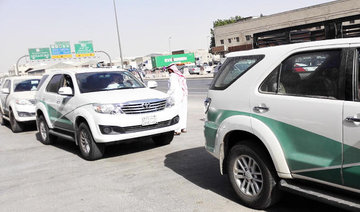DUBAI: Terrorist attacks by the Iran-backed Houthis will not prevent a rising level of American investment in Saudi Arabia, a leading US business expert has told Arab News.
Hall Delano Roosevelt, president of the US-Saudi Business Council and grandson of the 32nd US President Franklin D. Roosevelt, said: “Certainly it’s a concern for American businesses that are contemplating sending their people over to live in Saudi Arabia and to work there. Has it deterred US businesses from considering the opportunity to do so? I have to say no.
“It (terrorism) is just part of all of our lives at this point, wherever we are on the globe. You have to remain vigilant, and you have to remain careful and aware of what’s about you, whether you’re here in the United States, in Europe or anywhere in the Middle East,” he said.

The Houthi militia's increased attacks will not scare American investors from Saudi Arabia, says USSBC President & CEO Hall Delano Roosevelt. (Twitter: @US_SaudiBiz)
The attacks — stepped up against the UAE and Saudi Arabia recently — will not prevent American businesses from increased investment in the Kingdom, especially into the big sustainability strategy launched last year in the Saudi Green Initiative, Roosevelt said.
His verdict of the strength of the US-Saudi commercial relationship was delivered on “Frankly Speaking,” the series of video interviews with leading policymakers and businesspeople.
In the course of a wide-ranging conversation, Roosevelt — president and chief executive since 2019 of the 25-year-old council — spoke of the attractions of the Kingdom for US investors, the “growing pains” faced by some American businesses in getting bills paid on time, and the legacy of his grandfather’s historic meeting with King Abdulaziz in 1945 that inaugurated the modern era of trade and investment relations between the two countries.
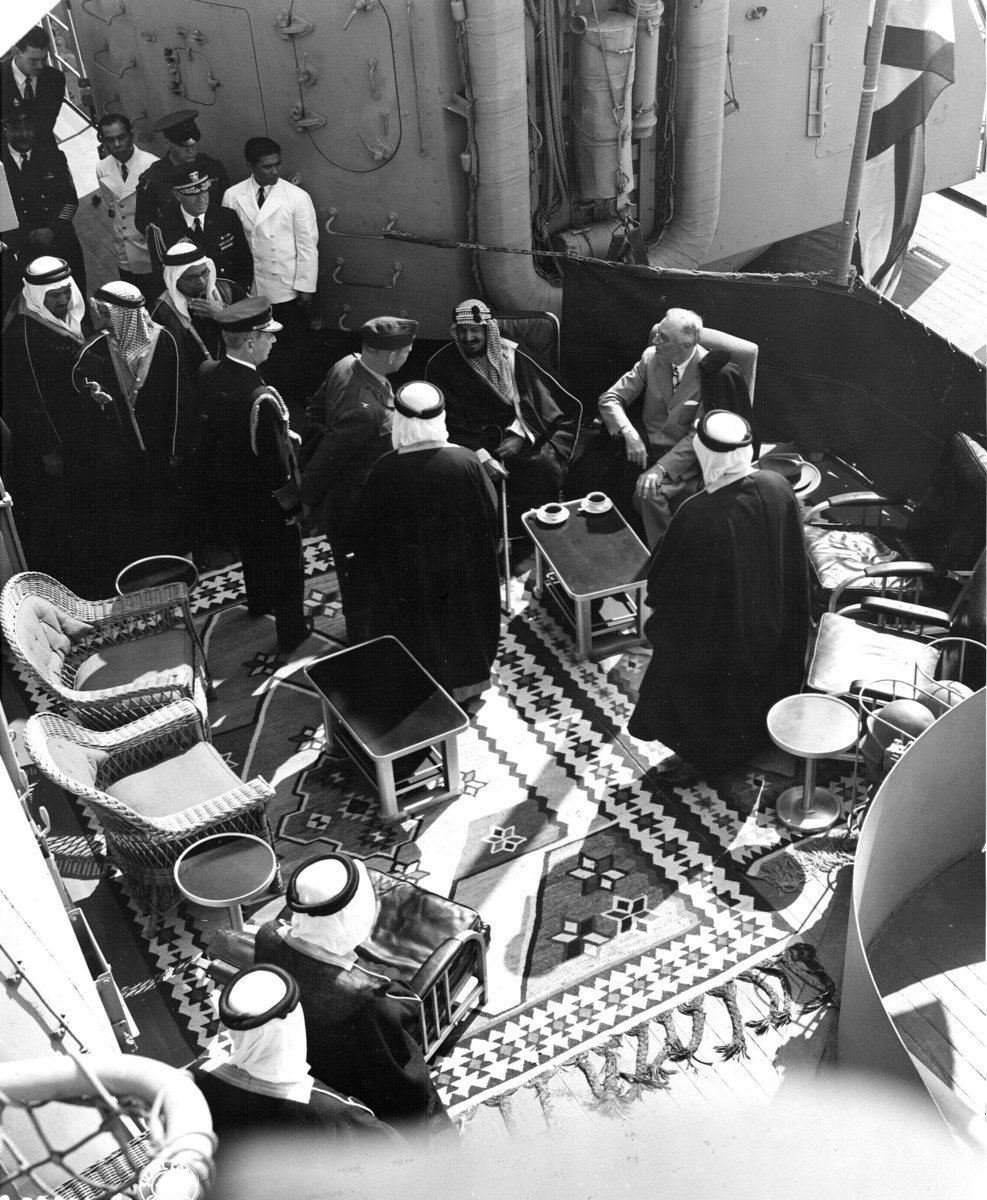
King Abdul Aziz meeting President Franklin D. Roosevelt aboard the USS Quincy in Great Bitter Lake, Egypt. (Franklin D. Roosevelt Presidential Library and Museum)
After the meeting, FDR returned to the US and called a special congressional meeting of the Senate and the House, Roosevelt said.
“One of the things that (FDR) specifically said in the meeting was: ‘I have learned more in the last 20 hours of conversation with this great individual King Abdulaziz bin Saud than in two years of personal and governmental communiqués between my offices and his offices,’” Roosevelt said.
“I think that there is a solid message in there that so much more can be accomplished by sitting down and having a conversation like this, rather than going through all of the formal protocols, and just getting to know each other as individuals and this — whether FDR knew it or not — is a very key component to the Arab culture, not just the Saudi culture.”
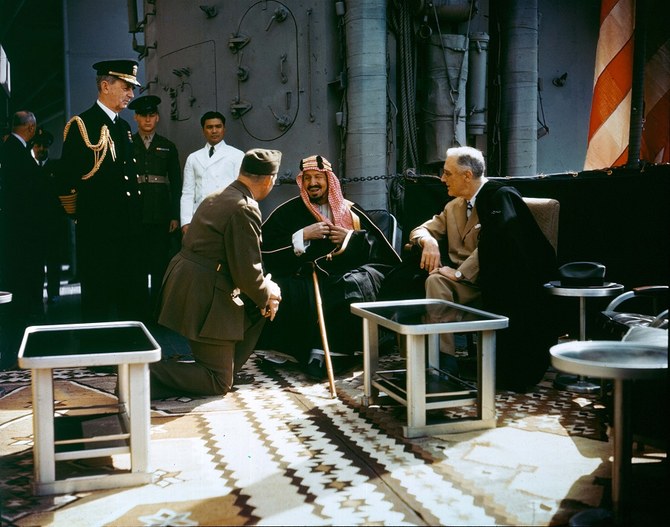
King Abdul Aziz meeting President Franklin D. Roosevelt aboard the USS Quincy in Great Bitter Lake, Egypt. (Franklin D. Roosevelt Presidential Library and Museum)
He also said that his grandfather — whose economic policies helped pull the US and the world out of the Great Depression — would have approved of the Vision 2030 strategy to transform the Kingdom’s economy and society.
“I can confidently suggest that he would have been very proud and supportive of working with the Kingdom of Saudi Arabia to achieve the Vision 2030. Why? Simply said — the betterment of her people,” Roosevelt said.
With regard to recent allegations concerning unexpected tax bills and slowness in settling contractual bills, Roosevelt dismissed the notion they were an obstacle to American businesses in the Kingdom, saying they were the result of Saudi Arabia’s increasing growth rate.
“I’m sure it’s not deterring; it’s causing pause and question,” he said. “Here at the Business Council, we have various sectors — we have defense members, we have healthcare members, we have goods and services members — and I would classify this issue of ‘accounts receivables’ as growing pains and trying to find the right system that will get everybody paid in a timely manner.”
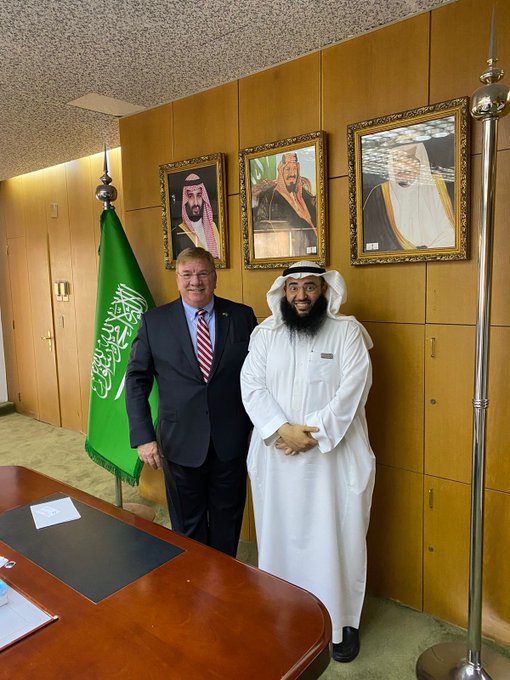
USSBC President & CEO Hall Delano Roosevelt meets with Saudi Industry and Mineral Resources Deputy Minister Osama Al-Zamill on Nov. 18, 2021 to investment opportunities. (Twitter: @US_SaudiBiz)
Roosevelt explained: “Why is it going on? It’s going on because they’ve been going through unprecedented growth in the Kingdom and newer systems have to be in place, rather than just sending an invoice to the Saudi embassy in Washington, D.C. or sending an invoice to the Ministry of Health where everything … might have been done manually with respect to bill payment.
“(They’re trying) to hire outside consultants that can expedite and bring efficiencies into that process of satisfying accounts receivables, and it’s working.”
Help is also at hand from the offices of the US embassy in Washington, D.C., according to Roosevelt.
“I can tell you first-hand from working directly with Her Royal Highness Princess Reema, the Saudi ambassador to the US. She directly involves herself in these issues and reaches out and connects directly with the Ministry of Health or Defense with respect to US companies that are experiencing a 300-day or 120-day issue in arrears and gets them satisfied,” he said.
Several American businesses contacted the US-Saudi Business Council last year when the Saudi government ruled that, in the future, multinational companies wanting to do official business in Saudi Arabia would have to have their regional headquarters in Riyadh, but Roosevelt said the new policy had been well received.
“We’re asking that you become a vested part of this community…hire local Saudis and train them and offer them the benefits of growth and education that you would your own folks,” he said.
There would also be significant benefits for US companies who do set up their main Middle East operations in the Saudi capital. “Once you become a local source, a vendor to the Kingdom, there are contracts where you’ll be given contractual preferences from the larger organizations there, like Aramco, Sabic,” said.

An illustration of NEOM, which will be built in Saudi Arabia’s Tabuk province. (NEOM.com)
“They’re going to look to take care of the local companies first and there are more, so it comes with incentives as well. So, I think it’s a good thing.”
American businesses are interested in many sectors in Saudi Arabia, notably the growth in leisure, entertainment and tourism, as well as the attractions of the NEOM development in the northwest. But, Roosevelt explained, the big lure for US investors is the Kingdom’s initiative in the energy transition and the campaign against global warming.
“Saudi Arabia has taken this whole world of sustainability and green production to heart. They have adopted it; they have accepted it and they’re embracing it,” he said.
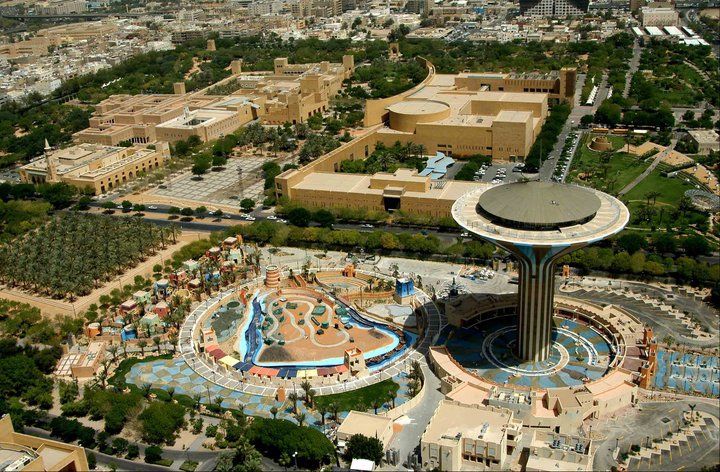
King Abdulaziz National Park in Riyadh. (Wikimedia Commons / Genius M.Nasim)
“For American businesses right now … I don’t believe you will find another country that is providing financial opportunity and incentive to bring the world of green and sustainable development, all technologies, into one place, where they’re willing to spend the money to help develop it and grow it, and more importantly, implement it.
“So, there is tremendous opportunity there. They are serious about it,” he said.
Roosevelt took issue with recent pleas by the Biden administration for Saudi Arabia to increase oil production to stem rising crude prices and suggested US shale producers should ramp up output to meet rising demand in the post-pandemic recovery.
“I might be one of the last remaining conservative registered Democrats in the country, but I certainly can see and make a case for shale production recovering, from a perspective of jobs and economic security,” he said.
“It’s just, why are we relying on someone else for something that we already have?”

























